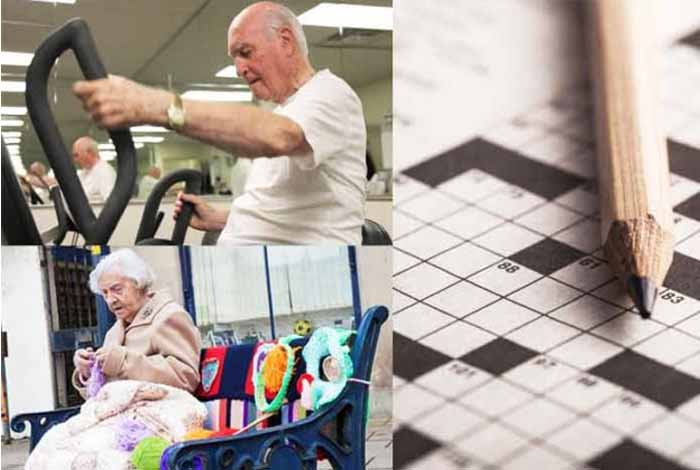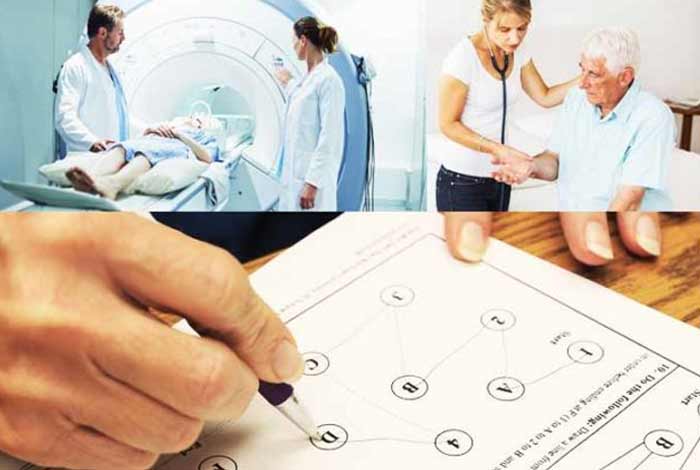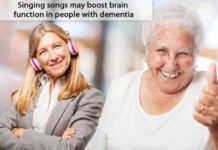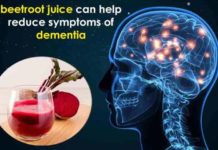
Overview and Facts
Brain is a wonderful organ that helps a person in perceiving different stimuli from his environment, respond to it and store information for future reference. Along with spinal cord, brain forms the body’s central nervous system (CNS), which is the major control network for body functions and abilities. It allows a conscious communication between the body and its immediate environment, and automatic operation of vital functions like breathing, maintaining blood pressure and hormone release.
Brain is divided into different regions according to the function performed by it. The limbic system, comprising hippocampus, amygdala, thalamus and other parts of the brain, is involved with memory formation and storage. Due to certain factors like age, heredity, mental disorders, these areas of brain get affected, leading to the development of dementia.
Dementia is a general term used for denoting a decline in mental ability, which is severe enough to affect the daily life of a person. It refers to a group of symptoms like memory loss and difficulties with thinking, language and problem-solving skills due to brain damage by diseases like Alzheimer’s or stroke. However, it can also arise from several other conditions like vitamin deficiencies, sleep disorder, thyroid problems, Lewy body disease, head trauma, Parkinson’s disease and Huntington’s disease.
Dementia is often inaccurately referred to as ‘senility’ or ‘senile dementia’ based on the misconception that serious mental decline is a normal part of aging. However, dementia is not a part of normal aging.
According to the World Health Organization (WHO), as of 2017, there are 47 million people living with dementia across the world, which is estimated to increase to 75 million by 2030 and almost triple by 2050. Every 3 seconds, a new of dementia is diagnosed globally. It is estimated to cost the U.S government a whopping 8181 billion USD per annum till 2017, and is projected to increase even more quickly in near future. Dementia affects women more severely than men. It is one of the leading causes of death in women in UK. Dementia can affect people from all walks of life. After the age of 65, with every five years, the risk of developing dementia doubles.

Types and Symptoms of Dementia
Following are the different types of dementia along with symptoms:
1. Alzheimer’s Disease: It is the most common form of dementia. Its cause has still not been identified. Patients with AD present themselves with an accumulation of abnormal proteins, known as called amyloid plaques, in certain areas of their brain. Although most patients of Alzheimer’s are 65 years old or more, it can affect people in their 40s or 50s as well.
Symptoms associated with Alzheimer’s disease are:
- Memory problems: Regularly forgetting recent events, faces and names
- Repetitive questions
- Increased difficulty with tasks that require organization and planning
- Increased confusion in unfamiliar environments
- Difficulty in finding right words
- Difficulty in dealing with numbers and/or managing finance
- Increased anxiousness
2. Vascular Dementia: It is the second leading cause of dementia after Alzheimer’s, and occurs due to multiple strokes occurring in the brain. In most of the cases, these strokes go unnoticed and the patient does not notice any of the symptoms. Some people can have both Alzheimer’s and Vascular dementia; often referred to as ‘mixed dementia.’ The symptoms can develop suddenly and get worse in a short duration of time, or, they might develop gradually, stretching over months and years. In this type of dementia, brain imaging indicates problems with blood vessels in the brain.
Symptoms associated with vascular dementia are:
- Stroke-like symptoms, including temporary paralysis on one side of the body or muscle weakness
- Movement problems – difficulty in walking or change in the pattern of walking
- Thinking problems – difficulty in paying attention, planning and reasoning
- Mood changes
3. Frontotemporal Dementia: It is a condition characterized by increased atrophy or shrinkage of frontal and temporal lobes of the brain. People below the age of 65 years are at a higher risk of developing frontotemporal dementia than the elderly. Most cases of frontotemporal dementia are diagnosed in people aged 45-65 years of age. It includes dementias like primary progressive aphasia, progressive supranuclear palsy, corticobasal degeneration and behavioral variant FTD (bvFTD). There is no distinguishing microscopic abnormality common in all the cases.
Early symptoms of frontotemporal dementia are:
- Personality changes – decreased sensitivity to other’s feelings
- Lack of social awareness – making inappropriate jokes or becoming very withdrawn and apathetic
- Language problems
- Obsessive behavior
4. Lewy Body Dementia/Lewy Body Diseases: This condition is caused due to the accumulation of abnormal proteins, alpha–synuclein, forming abnormal clumps, called Lewy bodies inside the brain cortex.
Symptoms associated with Lewy body dementia are:
- Alternate experience of being alert and drowsy
- Fluctuating levels of confusion
- Visual hallucinations
- Decreased physical movements
- Repeated falls and fainting
- Sleep disturbances
5. Creutzfeldt-Jacob disease: It is a rare condition in which accumulation of abnormal proteins occurs, causing destruction of brain cells, which eventually leads to dementia. In most cases, the exact cause is not evident; however, in some cases, genetic linkage might be found. Rarely, patients might have an exposure to abnormal protein like in mad cow disease, which is caused by prion infection. Misfolded prion protein causes a ‘domino effect’ in which prion proteins mis-fold and malfunction throughout the brain. The condition is known to progress rapidly, over only a few years.
Symptoms associated with Creutzfeldt-Jacob disease are:
- Loss of memory and thinking abilities
- Sudden jerky movements
- Vision problems
- Stiffness of arms and legs
- Insomnia
- Difficulty in swallowing
- Unsteadiness while walking or standing
6. Mixed Dementia: It occurs in people having two or more types of dementia, most commonly, Alzheimer’s and vascular dementia. Each type of dementia presents their hallmark abnormalities in the brain.
7. Normal Pressure Hydrocephalus: It is a condition in which there is abnormal enlargement of ventricles (fluid filled spaces in the brain), which puts a pressure on certain areas of the brain.
Symptoms associated with normal pressure hydrocephalus are:
- Abnormal gait (difficulty walking)
- Memory loss
- Speech problems
- Sudden falls
- Leg weakness
- Changes in behavior or mood
8. Huntington’s Disease: It is a disease in which the person has characteristic abnormal movements, known as chorea. It is a hereditary, progressive neurodegenerative disorder. The defective gene produces abnormal proteins in the brain that over time, produces various symptoms of this condition.
Symptoms associated with Huntington’s disease are:
- Progressive disorientation
- Confusion
- Personality disintegration
- Impairment of memory control
- Restlessness
- Agitation
- Abnormal gait
- Fidgety movements that cannot be controlled
- Trouble thinking through problems
9. Alcoholic Dementia: When a person consumes large amounts of alcohol, he gradually develops deficiency of thiamine (vitamin B1), leading to malfunctioning of brain cells that may result in memory loss. This is known as Korsakoff syndrome. Although this syndrome generally develops in alcoholics, it can also be seen in people having malnutrition.
Symptoms associated with alcoholic dementia are:
- Deterioration in intellectual function
- Loss of planning and executive functions
- Disregard for consequences of their behavior
- Changes in memory, loss of short-term memory
- Language impairment
- Inability to perform complex motor tasks like getting dressed
- Damaged nerves in legs and arms
- Psychosis
- Personality changes
10. Traumatic Brain Injury (TBI)/Dementia Pugilistica: When a blow, jolt, bump or any other head injury leads to brain damage, it is called traumatic brain injury. Some of these injuries can permanently damage the brain or can even cause death. Symptoms do not appear immediately, and can take weeks or even months for presenting themselves.
Symptoms associated with traumatic brain injury are:
- A headache that does not go away and gets worse
- Repeated vomiting or nausea
- Convulsions or seizures
- Slurred speech
- Inability to wake from sleep
- Dilated eye pupils
- Weakness or numbness in arms and legs
11. Others: There are certain other conditions that can cause changes within the brain, leading to cognitive decline. Some of these conditions are:
- Parkinson’s disease
- HIV/AIDS
- Meningitis
- Blood clots in brain
- Heart attacks
- Multiple sclerosis
- Use of some medicines and their reactions
- Children with Down Syndrome, Niemann-Pick disease, Lafora disease or Batten disease
- Infections and immune disorders
- Nutritional deficiencies
- Subdural hematoma
- Poisoning
- Brain tumors
- Anoxia/ hypoxia
- Metabolic problems and endocrine abnormalities

Risk Factors of Dementia
Risk factors associated with the development of dementia are:
- Age
- Family history
- Abnormal genes
- High blood pressure
- High cholesterol
- Diabetes
- Use of certain medications
- Down syndrome
- Mild cognitive impairment
- Heavy alcohol use
- Depression
- Smoking
- Sleep apnea

Do I have Dementia?
If you become a bit more forgetful, it does not imply that you have dementia. With age, many people notice a decrease in their cognitive abilities and memory. These symptoms might also occur due to depression, stress or other physical illnesses.
If you observe a severe decline in your memory or have difficulty in concentrating or following instructions, have frequent mood changes and struggle during a conversation to find the right word, then it might indicate that you have early symptoms of cognitive impairment. When these symptoms begin to affect your daily life, only then dementia is indicated.
It is to be noted that dementia is not a natural part of aging. If you observe any of the aforementioned symptoms, consult your doctor for proper diagnosis.

Causes and Prevention of Dementia
Causes of Dementia:
Dementia is caused when there is damage to the brain cells, which interferes with the communication occurring between these cells that ultimately affects the cognitive abilities of a person. There are different regions in the brain responsible for carrying out different functions like judgment, memory, speech and movement. When cells belonging to a particular region die, that area is unable to perform its function properly.
The type of dementia depends on the affected area of the brain, where the cell damage has occurred. For instance, in Alzheimer’s disease, there is accumulation of high levels of proteins inside and outside the brain cells, making it hard for the cells to stay healthy and communicate effectively. Hippocampus is a part of brain which is the center for learning and memory. Cells belonging to this area are the first to be damaged and therefore, memory loss is one of the earliest symptoms of Alzheimer’s.
Most of the changes occurring in the brain due to dementia are permanent and tend to become worse with time. However, problems in thinking and memory caused due to the following conditions might improve with time:
- Depression
- Medication side effects
- Excessive consumption of alcohol
- Thyroid problems
- Vitamin deficiencies
Some of the rare causes of dementia are:
- Corticobasal degeneration
- HIV infections
- Niemann–Pick disease; Type C

Prevention of Dementia:
Age and family history are some of the risk factors that cannot be avoided, but the researchers are exploring other factors that affect brain health and could prevent dementia. These factors include:
1. Cardiovascular Risk Factors: These factors affect blood supply to the brain by modifying blood vessels, which can deprive these cells of essential nutrients and oxygen. Changes in blood vessels can cause vascular dementia. These changes are also seen with Alzheimer’s, Lewy body dementia and other types of dementia. They might accelerate the deterioration process or make the existing impairments more severe.
Brain can be protected by eliminating these risk factors, such as:
- High cholesterol levels
- Hypertension
- Increased blood glucose level
- Cigarette smoking
- Obesity
- Alcohol consumption
2. Physical Exercise: Regular physical exercise helps in maintaining good health and decreases the risk of developing some types of dementia. There are some studies which indicate that exercise might affect the brain cells directly by increasing blood flow to the brain.
3. Diet: Consuming heart-friendly diets like the Mediterranean diet might help in protecting the brain, which include relatively little red meat and focuses more on the consumption of whole grains, fruits, vegetables, nuts, olive oil and other healthy fats.
4. Brain Exercise: With age, the chances of developing dementia increases. Hence, it is important to engage in brain-stimulating activities that help in keeping the mind sharp. Some of the ways in which a person can challenge his brain are:
- Learning a new language
- Trying new hobbies or crafts
- Learning to play a musical instrument
- Taking a class at a nearby local college
5. Other Preventive Methods: Some off the other methods that can be used to prevent brain aging are:
- Limiting the consumption of alcohol
- Getting adequate sleep
- Avoiding injuries
- Decreasing stress
- Maintaining an active social life

Diagnosis and Tests of Dementia
Diagnosing dementia and its type is quite challenging. In order to successfully diagnose dementia, at least two of the core mental functions should be impaired enough to interfere with the daily life of a person. These may include:
- Memory
- Language skills
- Ability to focus and pay attention
- Ability to reason
- Problem-solving ability
- Visual perception
Following tests are done to diagnose dementia:
1. Patient History: A complete history of a patient is taken into consideration to determine if dementia runs in his/her family. Also, facts regarding changes in behavior and personality, and whether the person is on any kind of medication is determined.
2. Physical Examination: In this, blood pressure and other vital signs of the patient are measured that might help physicians to detect any condition that might cause or occur along with dementia.
3. Cognitive and Neuropsychological Tests: These tests are performed to evaluate a person’s cognitive abilities. A number of tests are performed to measure cognitive skills like reasoning and judgment, memory, language skills, attention and orientation.
4. Neurological Evaluation: Physicians evaluate a person’s senses, balance, reflex, visual perception, attention and so on.
5. Brain Scans:
- CT Scan or MRI: These scans are done to detect any physical changes that might have occurred in the brain. These provide evidence of stroke, bleeding, tumor or any such abnormality present in the brain.
- PET Scans: These scans help identify patterns of brain activity. These scans also indicate the presence of amyloid proteins, which is the hallmark of Alzheimer’s.
6. Laboratory Tests: Blood tests are done to determine if there is any physical illness that might be affecting brain functions, like deficiency of vitamin B1 or under-active thyroid gland. In some cases, spinal fluid is examined for the signs of infection, inflammation, or markers of any degenerative disease.
7. Psychiatric Evaluation: A mental health professional tests whether a person has depression or any other underlying mental health condition.

Treatment and Care of Dementia
Treatment of Dementia:
Most types of dementia cannot be cured, but their symptoms can be managed by following therapies:
1. Medications: Some of the medicines that are used to manage the symptoms of dementia are:
a. Cholinesterase Inhibitors: These drugs increase the levels of a neurotransmitter – acetylcholine – which is involved in memory and judgment. Some of the drugs belonging to this category are:
- Donepezil
- Rivastigmine
- Galantamine
b. Memantine: It works by regulating the activity of glutamate – a neurochemical associated with learning and memory functions of the brain.
c. Other Medications: Physicians also prescribe certain medicines for treating depression, agitation, sleep disorders and other conditions accompanying dementia.
2. Therapies: Several symptoms of dementia can be managed by undergoing non-drug approaches like:
a. Occupational Therapy: An occupational therapy professional can help patients by teaching coping behaviors to prevent accidents, manage public behavior and prepare the patient for dementia progression.
b. Environment Modification: Decrease in clutter and noise levels can make it easier for a patient to improve his focus and attention. Care takers can hide objects that can threaten the safety of a patient like knives, car keys and other related stuffs. Monitoring systems can be installed that can help in alerting the care givers if the patient wanders.
c. Task Modification: Caregivers can be taught to break complex tasks into easier steps and help the patient in focusing. Structure and routine can also help these patients in decreasing confusion.
Caring for Dementia Patients:
With time, the disease progresses, and the patient becomes more and more dependent on his caregivers for carrying out daily activities. Following measures can be taken by the caregivers to help the patients maintain their independence and dignity as they become more and more dependent:
1. Reduce Frustrations:
Dementia patients might become frustrated as daily chores become difficult for them to manage. Some of the steps that can be taken to limit these challenges and ease frustrations are:
- Schedule Wisely: A routine can be established for decreasing confusion and making each day less challenging. These patients are still able to learn and follow routines.
- Establish Nighttime Ritual: People with dementia often display challenging behaviors during nighttime. Also, the care givers are tired from their daytime activities. It is suggested to establish a going-to-bed ritual that are calming, and distant from noise, active family members and meal cleanup. Night lights can be kept switched on in the bedroom, hall and bathroom to avoid disorientation. Rationed caffeine consumption, avoiding daytime napping and indulging in physical activities can help in easing nighttime restlessness.
- Keep a Calendar: A calendar can be maintained by the patient to keep track of upcoming events, daily activities and schedule of their medicines.
- Take Time: Dementia patients take more time to perform any task as compared to healthy individuals. The care giver is therefore suggested to have patience while dealing with them.
- Provide Choices: It is suggested to give at least a few choices to the patient rather than no choice.
- Provide Simple Instructions: Dementia patients best respond to clear, one-step instructions.
- Reduce Distractions: Distractions should be reduced to help dementia patient focus on the work he is doing.
2. Be Flexible:
The caregivers are advised to set their routines in accordance with that of the patients to maximize the quality of interaction and reduce frustration. They are advised to lower their expectation levels to avoid getting frustrated themselves.
3. Create a Safe Environment:
People with dementia have impaired judgment and problem-solving skills that increase their chances to get injured. Following measures can be taken to promote patient safety:
- Prevent Falls: Scatter rugs, extension cords and other such objects that can make the patient trip or fall should be avoided.
- Use Locks: Cabinets containing potentially hazardous objects like medicines and guns should be kept locked.
- Take Fire Safety Precautions: Matches, lighters and similar objects that can start a fire should be kept out of the reach of patient.
- Safe Flooring: It is suggested to have a single colored carpet at home to avoid confusion. Shiny or reflective flooring can be perceived as wet, and the patient might struggle to walk over it. It is also advised to avoid having rugs and mats because it might pose a problem for the patient.
- Use Contrasting Colors: Having contrasting colors on the wall and floors can help the patient in having a sense of depth and perspective. Also, furniture of contrasting colors make it easy for the patient to avoid tripping over.
- Avoid Reflecting Surfaces: Reflecting surfaces can be distressing for the patient since the reflection can be perceived by him as that of a stranger. It is advised to cover mirrors and close curtains at evenings, so that the patients cannot see their own reflection.
4. Focus on Individualized Care
Each dementia patient has his own set of symptoms and hence, requires tailor-made caregiving techniques.
5. Other therapies: Some other therapies that can be used to reduce agitation and promote relaxation in dementia patients are:
- Music therapy, which involves listening to soothing music
- Pet therapy, in which animals like dogs are involved to improve the moods and behavior of patients
- Aromatherapy
- Massage therapy
- Art therapy, involving creation of art; focusing on the process rather than outcome

OTC Medication and Self-Management for Dementia
Anticholinergic drugs like diphenhydramine, antihistamines like dimenhydrinate and others are available over-the-counter (OTC) drugs and can be used for managing symptoms of dementia. Also, vitamin B, vitamin E and omega-3 fatty acid supplements can be taken to improve memory. However, it is advised to consult a physician before taking any medicine or supplement.
For managing dementia, the patient can consider following tips:
- A calendar should be maintained to track upcoming activities and daily activities.
- A weekly timetable can be created and pinned to the wall.
- Keys, spectacles and other things should only be kept at their designated places.
- Labels could be put on cupboards and drawers.
- Emergency phone numbers should be kept nearby.
- Reminders can be written to oneself for remembering things like locking door before going out.
- Bills and debit cards should be kept carefully, so that they do not get misplaced.
- A pill organizer box can be used to remember which medicines are to be taken when.
- Newspapers can be taken to keep track of day and date.
- Social life should be maintained to avoid feeling lonely and depressed.
- Healthy lifestyle should be adopted to delay the progression of dementia.
- A healthy sleep-wake cycle should be maintained by adopting good sleep hygiene practices.
- Patients experiencing mood changes should talk about it with their families and seek medical help. Family members can try to remove or reduce trigger factors that cause mood swings.
- Patients should continue to engage themselves in hobbies and keep themselves busy in activities of their interest. Also, patients should try to indulge in mind stimulating activities like mental exercises and learning a new language.
- A healthy diet should be taken to keep the mind and body fit.

Natural Ways to Cure Dementia
Some natural remedies for treating dementia are as follows:
- Coconut Oil: Ketones and healthy fats present in coconut oil help in rebuilding the lining of nerves; thereby, enhancing neural communication and nerve function. Coconut oil is considered as ‘Magic Bullet’ for curing dementia.
- Pumpkin: Iron- and folate-containing vegetables like pumpkin and other similar squash species help in improving circulation and cognitive functions.
- Turmeric: Consumption of turmeric has shown to block the creation of meta-amyloid which is the source of plaque formation in the brain. These plaques complicate and compound the issues of dementia.
- Ginkgo: It is one of the oldest and most trusted natural remedies used to treat dementia. It increases micro-dilation and circulation within brain, and enhances short-term memory.
- Fish Oil: Omega-3 fatty acids present in fish oil can help in preventing brain lesions that often act as precursors for the development of dementia.
- Bananas: Being rich in potassium, bananas are potent vasodilators and increase oxygenated blood flow to the brain; thus, help improve cognition, concentration and memory.
- Cinnamon Extract: Plaque levels in the brain can be reduced by taking cinnamon extract.
- Almonds: Nuts like almonds are rich sources of minerals, antioxidants, magnesium, folate, vitamin B6 and omega-3 fatty acids that are known to bear cognition-enhancing properties.

Health Tip by Experts
Dementia is a disorder that can make a person excessively dependent on others for the rest of his/her life. However, with little effort, quality of life can be improved. It is therefore important to identify the cause and type of dementia, so that other complications arising due to improper diagnosis can be avoided. By having a healthy and disciplined lifestyle, active social life, and by engaging in mind-stimulating activities, it is possible to delay the progression of disease and lead a happy life.







